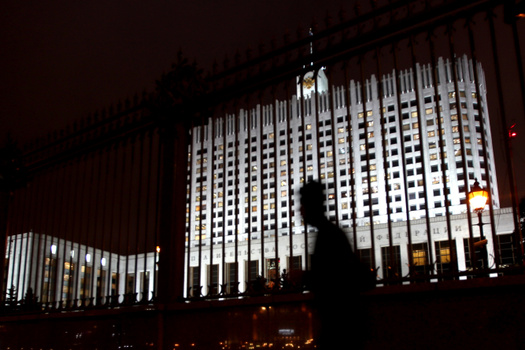
Blindsided Russia’s top officials were caught off guard by Putin’s war in Ukraine. Many of them want to resign — but can’t.
Мы рассказываем честно не только про войну. Скачайте приложение.
Two weeks have passed since Russia invaded Ukraine. Russian troops continue to shell Ukrainian cities as they try to make their way deeper into the country, but Ukrainian defense forces have successfully held them off. Meanwhile, the West (and some non-Western countries) continues to impose new restrictions on the Russian economy — there are now more sanctions against Russia than against any other country in the world. At the same time, international companies are leaving Russia en masse. To find out whether Russia's top officials were prepared for this war and its consequences, Meduza spoke to some sources from the inside.
According to Meduza’s sources, about a quarter of Russia’s top personnel considered resigning after the war in Ukraine began. Most were “proactive professionals familiar with best practices in the business and management sectors,” said the source, a person close to the Russian government.
Since the war started, however, there have been exactly zero high-profile resignations. Meduza’s source explained it this way: “Resigning right now would be seen as trying to escape. And for that, they’ll shoot you.”
Other sources close to the presidential administration emphasized that a lot of high-ranking officials and state corporation employees had no knowledge of Putin’s plans for a full-scale attack on Ukraine — and thus were not expecting such harsh sanctions from the West.
“Nobody was anticipating anything like this. We trained for some stressful scenarios, but nothing at this level. We were counting on relatively soft sanctions,” said one source close to the government.
According to him, until February 24, despite the sanctions that were already in place, government officials and heads of state could achieve tangible results in their professional lives. “Everyone could demonstrate their professional qualities both inside the country and outside. If they wanted to, of course. [Rosneft head Igor] Sechin didn’t really care whether his company was doing well or not. But [Sberbank head German] Gref was proud of his success: his bank was successful by global standards. [Sergey] Sobyanin seriously made Moscow into a world capital,” said a source close to Russia’s federal cabinet.
As a result, according to Meduza’s sources, the most frustrated people right now are the ones who were previously working towards concrete goals. “Now, nobody’s going to be able to achieve any clear success inside the country. And as for the outside world, that’s not even a question. No matter what we do, life’s going to get worse and worse,” said one source.
In the midst of that reality, all significant personnel appointments and changes have also been frozen — both for federal posts and for gubernatorial ones. A source close to the government told Meduza, “the most important thing [to the Kremlin] right now is that everyone be in their places; it’s not time to play musical chairs.” According to him, state officials are currently only allowed to change positions horizontally, not vertically.
Still, according to one source, there were plans for major personnel changes as late as early 2022 — including for ministerial positions. There was talk, for example, of former Putin bodyguard and current Tula regional governor Alexey Dyumin being appointed Emergency Situations Minister. The position has gone unfilled since the death minister Yevgeny Zinichev (another one of Putin’s former bodyguards) in 2021. Alexander Chupriyan, Zinichev’s former deputy, is still currently the acting minister.
Personnel changes were also being discussed within the political bloc led by Sergey Kiriyenko, first deputy head of the presidential administration. After the war began in late February, 2022, however, a Kremlin political strategist told Meduza that “there’s no longer demand for the technocratic approach to politics” that Kiriyenko had preached; “Now it's time for other kinds of people — ultra-patriotic ones.”
Story by Andrey Pertsev
Translation by Sam Breazeale